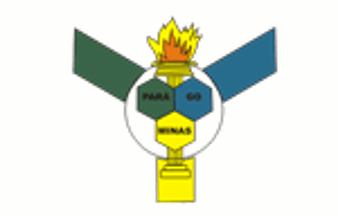 image by Dirk Schönberger,
11 February 2011
image by Dirk Schönberger,
11 February 2011Source: based on http://www.paragominas.pa.gov.br/index.php?mod=article&cat=S%C3%ADmbolos&article=64

Last modified: 2012-03-03 by ian macdonald
Keywords: paragominas | pará |
Links: FOTW homepage |
search |
disclaimer and copyright |
write us |
mirrors
 image by Dirk Schönberger,
11 February 2011
image by Dirk Schönberger,
11 February 2011
Source: based on
http://www.paragominas.pa.gov.br/index.php?mod=article&cat=S%C3%ADmbolos&article=64
A white flag bearing the municipal emblem in the center.
Official website at
http://www.paragominas.pa.gov.br
Dirk Schönberger,
11 February 2011
The municipality of Paragominas (97,788 inhabitants in 2010; 19,310 sq. km)
is located in northeastern Pará, on the border with Maranhão, 300 km of Belém.
Paragominas was founded by Célio Rezende de Miranda, who visited the region
in 1958 and convinced the same year President of the Republic
Juscelino Kubitschek to permit him to found a new town. Miranda's idea was to
prevent unorganized colonization of the region and looting of its natural
resources. Once granted land by the Governor of Pará Jarbas Passarinho,
Miranda asked the urbanist Lúcio Costa - who had been awarded the 4th prize
in the contest for the design of Brasilia - to draft the plans of the town.
The cornerstone of the town was blessed on 23 January 1961 by Bishop Eliseu
Coroli. Due to money shortage, Costa's original tri-hexagonal plan was
submitted to several modifications. The municipality is named for the
three States of origin of the colonists, Pará, Goiás and Minas Gerais.
The flag of Paragominas was designed in 1972 by the designer and teacher
Gláuco Amorim Celestino Teixeira, winner of a a public contest. The emblem in
the flag is quite different from the municipal coat of arms adopted in 1965.
The three hexagons in the middle of the flag represent the three States from
which the town originates: Pará, Goiás and Minas [Gerais]. The green hexagon
represents Pará and its forests, where the town was built. The blue hexagon
represents Goiás and river Araguaia, flowing from Goiânia to Pará. The yellow
hexagon represents Minas Gerais and gold, the source of its huge wealth in
the 18th century. The hexagons also represent the original design of the town
imagined by the urbanist Lúcio Costa, with three industrial, commercial and
residential areas, respectively. The colors are the same as in the national
flag, meaning that the town is the convergence of all races, people and
traditions, that is, of Brazilian culture. Green symbolizes the Amazonian
forest and is a tribute to ecology. Blue symbolizes the wide and abundant
Amazonian rivers and river Araguaia, used by the pioneers and required to
establish permanent settlements on the land. Yellow represents the mining
resources of the Amazonian underground, including gold, iron, uranium,
manganese, bauxite and kaolin (common in the municipality). White
symbolizes peace aspired to by all Brazilians. The Olympic torch is a tribute
to the Route of the Patriotic Symbolic Fire, which crossed the municipality
during the celebrations of the 150th anniversary of independence.
http://www.paragominas.pa.gov.br/index.php?mod=article&cat=S%C3%ADmbolos&article=64 - Municipal website
Ivan Sache, 9 February 2012